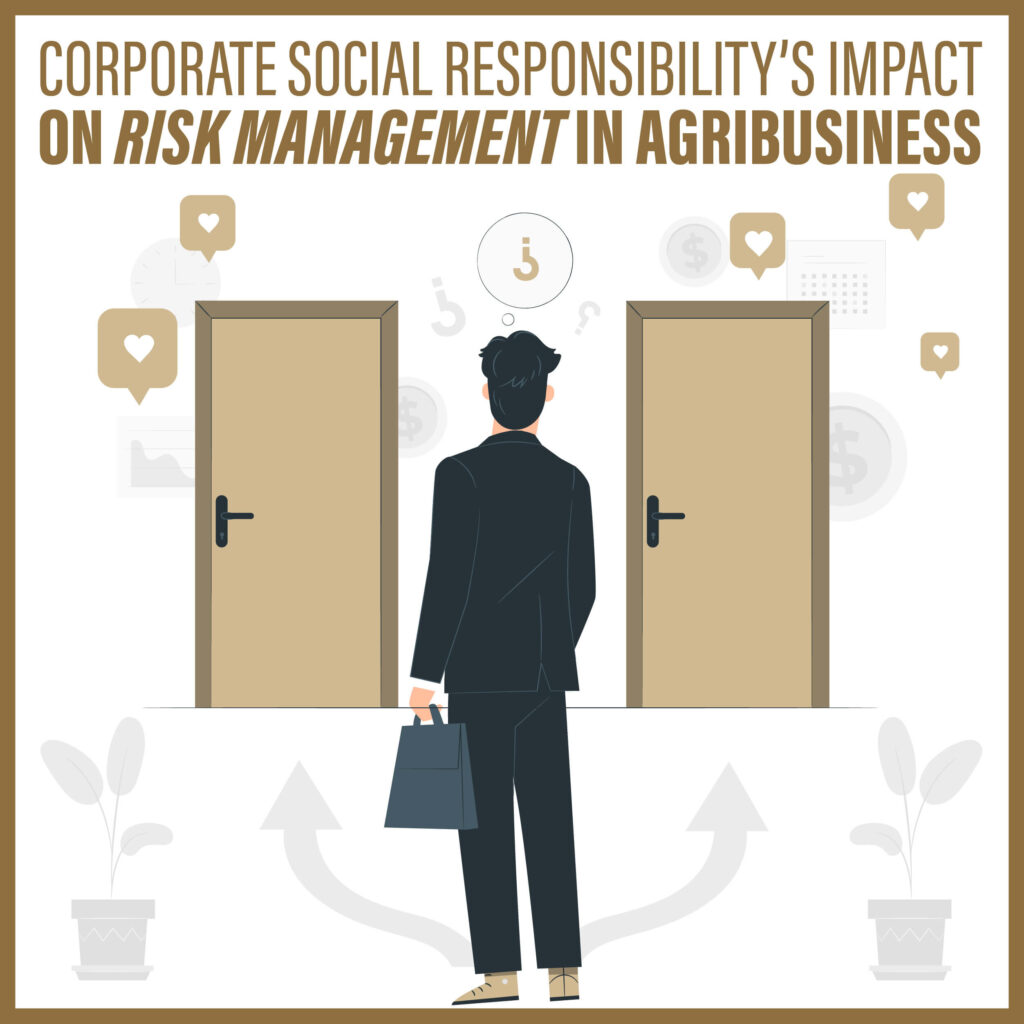Corporate Social Responsibility’s Impact on Risk Management in Agribusiness
Reviewer
David J. Williams, Graduate Research Assistant
Article
Risk Management and Corporate Social Responsibility by Sol Kim, Geul Lee and Hyoung-Goo Kang
Journal
Strategic Management Journal, Vol. 42, Issue 1, January 2021
Summary
Corporate social responsibility (CSR) is continuing to grow in importance to investors and consumers alike. Both groups are increasingly avoiding doing business with firms that conduct themselves in a manner consumers and investors deem undesirable. In response, managers have been and must continue adapting their firms to be more responsible or they could face real financial repercussions. But rather than viewing CSR as an unwelcome expense, managers would be better off viewing it as an opportunity to differentiate themselves from their peers. Similar to the growing consumer consciousness of what pesticides and production practices are used to make their food and the price premium paid for certified organic, CSR may offer benefits to farmers if they choose to embrace this changing environment.
The Strategic Management Journal article by Kim, Lee and Kang examines how CSR activity affects the riskiness of a company’s stock. The study finds that taking part in CSR activity effectively acts as a type of insurance. The tradeoff here is that CSR activity costs money, so firms must choose between reducing risk and reducing cost, as it is typically not possible to reduce costs while also reducing risk.
After moderately sized negative events, firms with high levels of CSR activity are impacted significantly less than those that do not maintain a high level of CSR activity. However, CSR activity is not enough to compensate for large negative events. The authors give the example of British Petroleum (BP) and the Deepwater Horizon oil spill. Prior to Deepwater Horizon, BP was seen as one of the most socially responsible companies around, but after the devastating oil spill, their corporate social responsibility was seen as “greenwashing”. The beneficial risk-management effect of CSR is also far more pronounced for risky, uncertain, high-growth firms than ones which are financially stable.
How does this affect farmers and agribusiness?
The study provides convincing evidence that stocks of publicly traded companies become less risky when those companies are socially responsible. These results are directly applicable to large, publicly traded agribusiness corporations. Improving the company’s corporate social responsibility will come with benefits to shareholders in the form of more stable stock prices; therefore, this should be considered as managers conduct a cost-benefit analysis to determine the degree of CSR to achieve.
With increased adoption of practices that are seen as being socially responsible such as enhanced conservation or other sustainability initiatives, there is increased opportunity for agribusinesses to adopt CSR activities. However, just like the authors describe, CSR activities come at a cost through either increased input prices or potentially decreased revenue. An example of this is that there are disincentives for agricultural input retailers and input manufacturers for adopting certain CSR activities. The reason for this is that adoption of these activities may mean farmers would need less of certain inputs. With this in mind, there are examples of companies putting an emphasis on CSR despite the potential for decreased revenue. This highlights the perceived benefit, as was described in the article, for these activities.
For farmers, however, the evidence is less clear. Volatility in stock prices can be caused by one of two things — either firms’ fundamentals or investors. If the volatility in stock prices is only reduced because of activist investors, this study won’t apply to your typical family farm. However, if the volatility is caused by less detrimental impacts on the firm’s bottom line, such as a more resilient consumer demand caused by a more loyal customer base that appreciates and rewards more ethically and socially responsible conduct, then these results will directly impact farmers.
Managers trying to determine if increasing CSR is right for them should look to recent examples of public outcry that have happened after a negative incidence on a livestock farm. Firms which have a prior reputation of treating animals ethically and responsibly may have customers who are more loyal following a bad news story. However, according to this research, no amount of corporate social responsibility may make up for it if the news story is sufficiently bad, and any attempt to do so may be considered “greenwashing”.
Overall, this article shows that adopting CSR activities may have a great deal of beneficial outcomes for firms in the agricultural supply chain. If a negative event were to occur, firms with large CSR activities would stand a higher chance of emerging unscathed.
RELATED POSTS:
A great moment for value-based sales in agribusiness
Value-based sales can empower companies to craft compelling value propositions, understand the customer’s business model and effectively communicate to stakeholders.
How can big data empower the development of new products?
Data is one of the most powerful resources for a company. It enables accurate decision-making and minimizes risk, ensuring greater revenue and sustainable growth.
Unlocking Growth: Exploring innovation dynamics in the agrifood sector
The future for the agrifood sector appears promising, driven by technological advances, strategic M&A activity and a growing commitment to innovation.
